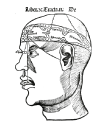Solomon Asch
Solomon E. Asch (September 14, 1907 - February 20, 1996) was a world-renowned American Gestalt psychologist and pioneer in social psychology. He was born in Warsaw which then belonged to the Russian Empire, and emigrated to the United States in 1920. He received his bachelor's degree from the College of the City of New York in 1928. At Columbia University, he received his master's degree in 1930 and Ph.D. in 1932. He was a professor of psychology at Swarthmore College for 19 years, working with psychologists including Wolfgang Köhler.
He became famous in the 1950s, following experiments which showed that social pressure can make a person say something that is obviously incorrect.
This experiment was conducted using 123 male participants. Each participant was put into a group with 5 to 7 "confederates" (People who knew the true aims of the experiment, but were introduced as participants to the naive "real" participant). The participants were shown a card with a line on it, followed by another card with 3 lines on it labeled a, b, and c. The participants were then asked to say which line matched the line on the first card in length. Each line question was called a "trial". The "real" participant answered last or penultimately. For the first two trials, the subject would feel at ease in the experiment, as he and the other "participants" gave the obvious, correct answer. On the third trial, the confederates would start all giving the same wrong answer. There were 18 trials in total and the confederates answered incorrectly for 12 of them, these 12 were known as the "critical trials". The aim was to see whether the real participant would change his answer and respond in the same way as the confederates, despite it being the wrong answer.
Solomon Asch thought that the majority of people would not conform to something obviously wrong, but the results showed that participants conformed to the majority on 32% of the critical trials. However, 25% of the participants did not conform on any trial.
He also cooperated with H. Witkin and inspired many ideas of the theory of cognitive style.
He inspired the work of the controversial psychologist Stanley Milgram and supervised his Ph.D at Harvard University.
Notable Contributions
- Halo effect
- Primacy effect
- Asch conformity experiments
External links
| Psychology |
| History |
| Psychologists |
| Divisions |
|---|
| Abnormal |
| Applied |
| Biological |
| Clinical |
| Cognitive |
| Comparative |
| Developmental |
| Differential |
| Industrial |
| Parapsychology |
| Personality |
| Positive |
| Religion |
| Social |
| Approaches |
| Behaviorism |
| Depth |
| Experimental |
| Gestalt |
| Humanistic |
| Information processing |
Credits
New World Encyclopedia writers and editors rewrote and completed the Wikipedia article in accordance with New World Encyclopedia standards. This article abides by terms of the Creative Commons CC-by-sa 3.0 License (CC-by-sa), which may be used and disseminated with proper attribution. Credit is due under the terms of this license that can reference both the New World Encyclopedia contributors and the selfless volunteer contributors of the Wikimedia Foundation. To cite this article click here for a list of acceptable citing formats.The history of earlier contributions by wikipedians is accessible to researchers here:
The history of this article since it was imported to New World Encyclopedia:
Note: Some restrictions may apply to use of individual images which are separately licensed.
